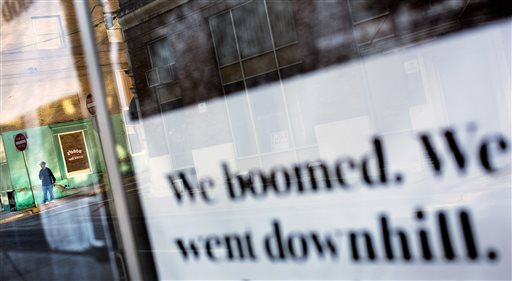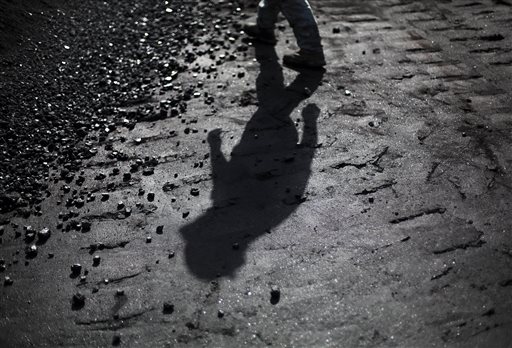‘Coal is about the only thing Central Appalachia has’
December 2, 2015 by Ken Ward Jr.
A pedestrian stands on a street corner as a message is displayed in a storefront window along the business district, Wednesday, Oct. 7, 2015, in Welch, W.Va. (AP Photo/David Goldman)
As we waited at the Robert C. Byrd United States Courthouse yesterday for word on any movement by the jury in the Don Blankenship criminal case, it was interesting to sit in on a hearing that U.S. District Judge Irene Berger was having on another coal-related case. The Gazette-Mail’s Kate White had written about it before, prior to it being moved to federal court:
A Wyoming County couple says the buildup of methane gas from an underground mining operation caused an explosion at their home Sunday — a week after the couple filed a lawsuit against the mining company.
James and Rose Surratt, who own two properties on Woosley Road in Pineville, filed a motion Tuesday asking for emergency injunctive relief against Pinnacle Mining Co. James Surratt is an underground coal miner for Pinnacle. The company is in the beginning process of setting up an underground longwall mine that runs, in part, underneath Woosley Road.
In addition to the lawsuit filed last week by the Surratts, other residents and a small-business owner on or near Woosley Road also filed a lawsuit Tuesday against Pinnacle Mining for damages that allegedly occurred after the company began operations in their area.
Some of the out-of-town press seemed at least mildly interested. Watching the hearing was better than just sitting on the wooden benches in the courthouse lobby, though plenty of other media were content to read their novels, chat or speculate about what the jury was up to. A few folks were amazed by the case — I mean, come on, the house blew up, right?
Of course, West Virginians and other coalfield residents know that suffering all manner of mishaps, inconveniences — and disasters — has long been part of living life with the mining industry.
Anybody who was paying much attention yesterday when the residents’ expert witness, legendary mine engineer and inspector Jack Spadaro, was explaining his professional history — from his early days following the Farmington Mine Disaster, to his investigation of the Buffalo Creek Disaster, to his work on the Martin County Disaster — could not help but be reminded of that. And of course, as Spadaro rattled off those terrible parts of our history, eight women and four men in the next room were deliberating on the future of Don Blankenship, the former Massey Energy CEO whose indictment was spurred by a federal investigation of Upper Big Branch, the worst coal-mining disaster here in a generation.
At about the same time, readers around the world were checking out the latest “big picture” take on the region’s coal industry, provided by The Associated Press:
The seams of coal in some of Eddie Asbury’s mines in McDowell County are so thin that workers can barely squeeze down them. They enter on carts nearly flat on their backs, the roof of the mine coursing by just a few inches above their faces. They don’t stand up all day.
To keep his business operating with such a paltry amount of coal, Asbury has to do everything himself. He has no use for the shiny, multimillion-dollar mining machines on display this fall at the biannual coal show nearby. His equipment is secondhand stuff that he repairs and refurbishes. The coal he and his workers scrape out of the mountain is washed and prepared for sale in a plant Asbury and a colleague built themselves.
“It’s how we survive,” said Asbury, 66, a miner since 1971.
Then there’s this kicker of a line:
Even coal is barely surviving in coal country — and coal is about the only thing Central Appalachia has.

Superintendent Jackie Ratliff, a coal miner of 25 years, walks towards a pile of coal waiting to be shipped at a processing plant Tuesday, Oct. 6, 2015, in Welch. (AP Photo/David Goldman)
Perhaps we — or at least I — have become a bit immune to the impact of statements like that. We surely have become a bit immune in our political discourse to the realities of our complicated relationship with coal, especially to the impacts its production and use has on our local environment and public health and to our global climate.
But it’s also true that, while many West Virginia leaders will be quick to point out any variety of other economic development projects and successful industries, if the outside world believes all we have is coal, that’s partly because in their zeal to attack Obama administration environmental rules, those leaders overplay their hand about coal’s importance. All of which is not to say that, for too many communities in our state, the only real option for good-paying jobs remain those either directly or indirectly linked in some way to coal mining.

Don Blankenship gives a smile to his legal team during Tuesday’s lunch break.
For me, the last two months have been focused on the testimony, the legal arguments, and then the waiting, of the Blankenship trial. Perhaps the end, at least of this particular chapter, is near. Maybe a verdict will emerge today or before the week ends. Or maybe the jury will remain deadlocked, forcing U.S. District Judge Irene Berger to declare a mistrial.
U.S. Attorney Booth Goodwin hasn’t provided any real public indication of whether he would retry the case if the jury hangs. But lead defense lawyer Bill Taylor has made it clear he doesn’t think there ever should have been an indictment — much less a trial. Taylor said yesterday:
This jury’s been, been deliberating earnestly in this case for two weeks minus the holidays, obviously. It’s done an incredibly conscientious job in a case which, with all due respect, is, is not one that makes you wonder why the jury can’t reach a verdict. There are a lot of reasons why in this case you could understand the jury not being able to reach a verdict.
But among the speculation about the jury’s deliberations, one of the most interesting conversations I’ve had at the courthouse was yesterday, when I was talking to a coal industry guy I know a little bit from past stories. We we were talking about the “Allen charge” and what it’s supposed to encourage jurors to do — basically talk to each other, listen to each other, and be willing to be convinced we’re wrong about something.
No matter what happens with the Blankenship trial, it sure seems like West Virginians — and especially our political leadership — should maybe think about some of what Judge Berger told the jurors:
During your deliberations you should be open-minded and consider the issues with proper deference to and respect for the opinions of each other, and you should not hesitate to re-examine your own views in the light of such discussions. If at this point you find yourself in the minority, please listen and carefully consider the views of the majority. If you find yourself in the majority, please listen and carefully consider the views of the minority.

 Subscribe to the Coal Tattoo
Subscribe to the Coal Tattoo
